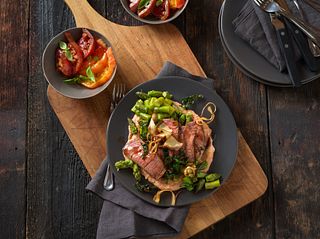Butcher Block Talk: The Pandemic Pivot
Eight individuals made up of butchers, processors, and small retailers from across the Northeast had the opportunity September 2 to virtually meet for a collaborative roundtable discussion talking about challenges with COVID-19 to their businesses and how to stay connected and relevant with their customer bases during the Butcher Block Talk: The Pandemic Pivot virtual e-vent.
Attendees from across the Northeast region networked with fellow beef supply chain members, many of which may never have crossed paths due to their varying backgrounds. Though the pandemic may have cancelled many in-person events this year, it has allowed the opportunity for networking/collaborative efforts such as these to occur with those in the supply chain industry to discuss and develop ways to work around challenges we are all currently facing as a country. Participants were asked to take a “pulse” on their current pain points felt throughout the course of the pandemic, with many hinting to lack of processor availability and bottleneck issues felt throughout supply chain. However, with all the hurdles these supply chain professionals have faced they still look hopeful to the future, many stating they felt optimistic, blessed, slightly overwhelmed due to how busy their workload has been but resilient despite the challenges they’ve encountered along the way.
"What’s really hurt supply chain was that prior to COVID-19, Americans were eating several meals per week out of the household approximately 60-70% of beef produced was going to foodservice and export markets. When COVID-19 hit, that supply didn’t just go away and had to go somewhere, and the result was a backlog of product in cold storage with the shutdown of foodservice."
-Dr. Jonathan Campbell
An array of topics were covered during the evening, from changing day to day operations by shifting consumer mindsets to navigating the virtual world and maintaining connections with consumers. Featured speaker, Dr. Jonathan Campbell, Associate Professor of Meat Science at Penn State University touched on the various ways to “steak swap” and provided suggestions operators could provide to their customers as many retailers and processors deal with the many challenges such as processing space and availability. When asked about the biggest hurdles the supply chain has faced over the past few months Dr. Campbell commented, “What’s really hurt supply chain was that prior to COVID-19, Americans were eating several meals per week out of the household approximately 60-70% of beef produced was going to foodservice and export markets. When COVID-19 hit, that supply didn’t just go away and had to go somewhere, and the result was flooding of product in the marketplace and mark down of items due to the increase in supply- to a degree much of the product was back logged in freezer storage and didn’t make it to foodservice.”
Attendees also heard from Rob Hess, PA Beef Producer and owner of Bow Creek Farms out of Hershey, PA. Rob walked through the ins/outs of his experiences with e-commerce and lessons he’s learned running his farm and retail business during a pandemic. “Truthfully, I think will move past COVID at some point and I think that online will be more important to us than it is right now but at this point we are so busy in store and we’ve felt that it was more important to take care of our local customers rather than worrying to expand geographically at this time during the pandemic.” Participants received Butcher Boxes as a “Thank You” for attending the “meating” and sharing their insights and input, items included butcher knives, cut resistant gloves and exclusive NEBPI apron. By hosting an interactive e-vent, the NEBPI hopes to continue to drive the discussion during these unprecedented times.
The event was made possible by funding support through the Checkoff’s Northeast Beef Promotion Initiative (NEBPI), a subcontractor to the Beef Checkoff. To learn more about the NEBPI program, visit www.nebpi.org and for more information about your Beef Checkoff investment, visit BeefBoard.org.
###
The Beef Checkoff Program was established as part of the 1985 Farm Bill. The checkoff assesses $1 per head on the sale of live domestic and imported cattle, in addition to a comparable assessment on imported beef and beef products. States may retain up to 50 cents on the dollar and forward the other 50 cents per head to the Cattlemen's Beef Promotion and Research Board, which administers the national checkoff program, subject to USDA approval. Internal links within this document are funded and maintained by the Beef Checkoff. All other outgoing links are to websites maintained by third parties.
Media Contact: Arika Pellman, 814-623-2698; [email protected].

Share This Page